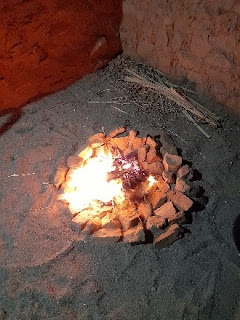Thankfully we do have one more substantial room that has thick stone walls and a flat mud roof supported by wooden beams and an array of palm branches, but how do we keep it warm? The traditional human response over many millennia has been to wrap up warm and burn a lump of carbon rich wood. Then with the industrial revolution came fossil fuels, and later oil and gas followed finally by the 'carbon free' revolution of nuclear fission. All of these come with an environmental cost.
There is a small firepit outside in the yard, we have used it twice so far this winter, but we can’t safely have a fire in our room as carbon monoxide would be a serious risk; there are no windows and naturally we keep the one door shut. Amazingly enough the room is always warm and we sit in it on an evening with a temperature of 19C as the temperature plummets outside. The thick walls and roof absorb the heat of the day, often being one or two degrees warmer than the air outside at midday. Even on the day when at dawn the temperature was 0C it was 16C inside. A simple cost-effective solution carbon free solution to heating. This room is great for evenings, but we are not true troglodytes, and so we don’t sleep indoors.
We prefer to sleep our mat covered bedroom, it is well ventilated and the kitchen and stone room along the walls of the yard against which it is built shield us from the intermittent cool breeze. We sleep on the floor but the foam mattress insulates us from the cold ground and we have an all-weather sleeping bag with a liner from the UK all of which is covered by a heavy blanket from the local market.
We are first awoken just before dawn by the call from the mosque and then as the sun’s rays filter through the matting we know it’s time to get up, to a rather chilly bedroom, put on a thick jumper , and do some exercises . Then whilst one of us prepares a breakfast of semolina to be taken in our nice warm retreat ,the other has the hand chilling job of washing up the pots from the night before. Back in our stone room for breakfast we soon warm up
As for our other energy needs, all of our electricity for lights, computers, telephones, small fridge, charging batteries etc comes from solar panels on the kitchen roof and sun is in plentiful supply all year round. Our cooking is done using a solar oven and on one kerosene burner, 1.5l of fuel a week and we walk the 5 minutes to work into town for shopping and don’t use a car from one month to the next.
Due to circumstances we have become inadvertent eco warriors, at least on a daily basis. However, there are one or two issues, unfortunately the Cessna Caravan which MAF use to fly us 1700 km to Bardai does burn aviation fuel, for the moment there is no choice, but a prototype battery powered Caravan flown last year has a range of around 200km, so there is some hope for the future. Then on our annual flight back to the UK we are responsible for plenty of CO2 emissions, but at least that is offset by BMS with environmental projects such as the solar panels for Bardai hospital still trying to do our bit for a greener Sahara.
Writing this we do not want to be out of touch with reality of life in the UK or Chad, saying “keep warm and well fed” and overlooking other people’s physical needs. (James 2:14). We know that we are amongst the fortunate in our housing and equipment, well adapted to living in specific ecological niche climate, a very small town with a warm mid-day sun, no serious wind and very dry. It would be quite different sleeping outside in the wet and windy Britain, or for that matter living in a cold and damp house trying to decide whether to eat or feed the meter. Our faith should compel us to action to alleviate this poverty that is sadly all too common.
For those of us with comfortable warm homes, our experience does show the importance of very good insulation, turning down the thermostat a degree or two, appropriate clothing and thick bedding in reducing both heating bills and helping the planet by reducing carbon emissions. Oh, and we forgot to say, slippers on an evening and bed socks, both of which we associated with the older generations are also very useful, even for fashion conscious youngsters like us.






